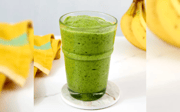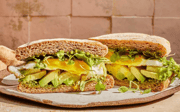Is your breakfast drink raising your risk of diabetes? New research suggests it might
By
Veronica E.
- Replies 1
Disclaimer: The information provided in this article is for educational purposes only and is not intended as a substitute for professional medical advice, diagnosis, or treatment. Always consult your physician or other qualified healthcare providers with any questions you may have regarding a medical condition or before making any changes to your health regimen.
For many of us, starting the day with a sweet, refreshing drink feels like second nature.
It’s bright, it’s comforting, and it’s been a breakfast staple for generations.
But recent research is casting doubt on whether that familiar morning ritual is as healthy as it seems—especially for older adults concerned about blood sugar and long-term health.
A team of researchers at Brigham Young University recently examined how certain foods and beverages may affect your risk for type 2 diabetes.
And while the findings weren’t what most of us expected, they’re sparking important conversations about what really belongs on your breakfast table.

What the study found
Led by nutrition expert Dr. Karen Della Corte, the BYU research team analyzed data from nearly 800,000 adults across 29 long-term studies.
Their goal was to compare the health effects of eating sugar from whole fruits versus drinking it in liquid form, like juices or sodas.
The findings? Not all sugar is created equal.
So what’s going on? It comes down to fiber—or the lack of it.
Also read: Lower your risk of diabetes with this delicious daily snack!
Why drinking sugar is worse than eating it
When you eat whole fruits, you're also getting fiber.
Fiber slows down how quickly your body absorbs sugar, helps you feel full, and supports healthy digestion.
Juice, on the other hand, strips away most of that fiber, leaving you with a fast-absorbing sugar bomb that can overwhelm your system.
A standard 8-ounce glass of orange juice contains 18 to 21 grams of sugar—that’s almost the entire daily recommended limit for women, and over half the limit for men, according to the American Heart Association.
And that’s before factoring in toast, cereal, or coffee creamer!
Even 100% juice can cause a rapid rise in blood sugar, especially when consumed regularly.
Over time, this can lead to inflammation, insulin resistance, and a higher risk of type 2 diabetes.
Also read: Avoid these breakfast mistakes that can secretly spike your blood sugar levels!
Smarter swaps for a healthier breakfast
If you love the flavor of fruit in the morning, you don’t have to give it up—just change the form!
Experts suggest:
As we grow older, our bodies become less efficient at handling sugar, making blood sugar control even more important.
Type 2 diabetes already affects over 37 million American adults—and for those over 60, the risks of complications can be more serious.
That’s why making thoughtful choices at breakfast can have a big impact on long-term health.
Read next: Warning: What your feet reveal about your heart health

Have you made changes to your breakfast routine to cut back on sugar? Do you have a go-to morning meal that helps keep your energy steady? Share your favorite low-sugar tips or recipes in the comments—your insight might help someone else make a healthy change!
For many of us, starting the day with a sweet, refreshing drink feels like second nature.
It’s bright, it’s comforting, and it’s been a breakfast staple for generations.
But recent research is casting doubt on whether that familiar morning ritual is as healthy as it seems—especially for older adults concerned about blood sugar and long-term health.
A team of researchers at Brigham Young University recently examined how certain foods and beverages may affect your risk for type 2 diabetes.
And while the findings weren’t what most of us expected, they’re sparking important conversations about what really belongs on your breakfast table.

A bright breakfast favorite—but is that glass of juice doing more harm than good? New research urges a closer look. Image Source: Pexels / Foodie Factor.
What the study found
Led by nutrition expert Dr. Karen Della Corte, the BYU research team analyzed data from nearly 800,000 adults across 29 long-term studies.
Their goal was to compare the health effects of eating sugar from whole fruits versus drinking it in liquid form, like juices or sodas.
The findings? Not all sugar is created equal.
- Just one extra 8-ounce glass of fruit juice per day was linked to a 5% increase in the risk of developing type 2 diabetes.
- Sugary beverages like sodas and energy drinks were even worse—each 12-ounce serving raised the risk by 25%.
- Whole fruits and even honey didn’t show the same risk and, in some cases, may even offer health benefits.
So what’s going on? It comes down to fiber—or the lack of it.
Also read: Lower your risk of diabetes with this delicious daily snack!
Why drinking sugar is worse than eating it
When you eat whole fruits, you're also getting fiber.
Fiber slows down how quickly your body absorbs sugar, helps you feel full, and supports healthy digestion.
Juice, on the other hand, strips away most of that fiber, leaving you with a fast-absorbing sugar bomb that can overwhelm your system.
A standard 8-ounce glass of orange juice contains 18 to 21 grams of sugar—that’s almost the entire daily recommended limit for women, and over half the limit for men, according to the American Heart Association.
And that’s before factoring in toast, cereal, or coffee creamer!
Even 100% juice can cause a rapid rise in blood sugar, especially when consumed regularly.
Over time, this can lead to inflammation, insulin resistance, and a higher risk of type 2 diabetes.
Also read: Avoid these breakfast mistakes that can secretly spike your blood sugar levels!
Smarter swaps for a healthier breakfast
If you love the flavor of fruit in the morning, you don’t have to give it up—just change the form!
Experts suggest:
- Choosing whole fruits like apples, oranges, or berries instead of juice
- Adding fruit to oatmeal, yogurt, or smoothies with greens and protein
- Diluting juice with water or sparkling water to reduce sugar per serving
- Sipping on herbal teas or fruit-infused water for a refreshing alternative
- Using honey in moderation for a gentle touch of sweetness
As we grow older, our bodies become less efficient at handling sugar, making blood sugar control even more important.
Type 2 diabetes already affects over 37 million American adults—and for those over 60, the risks of complications can be more serious.
That’s why making thoughtful choices at breakfast can have a big impact on long-term health.
Read next: Warning: What your feet reveal about your heart health
Key Takeaways
- A new study has found that drinking fruit juice, including orange juice, can increase your risk of developing type 2 diabetes, while eating whole fruits or consuming honey does not have the same effect.
- Each extra daily glass of fruit juice raises diabetes risk by 5%, while sugary soft drinks like sodas and energy drinks up that risk by 25% per serving.
- Fruit juices contain high levels of sugar and often lack the fiber found in whole fruits, which is important for gut health and maintaining stable blood sugar levels.
- Experts are urging people to eat whole fruits instead of drinking juice and suggest that dietary guidelines should focus more on the health risks of liquid sugars, rather than treating all sugars the same.
Have you made changes to your breakfast routine to cut back on sugar? Do you have a go-to morning meal that helps keep your energy steady? Share your favorite low-sugar tips or recipes in the comments—your insight might help someone else make a healthy change!






